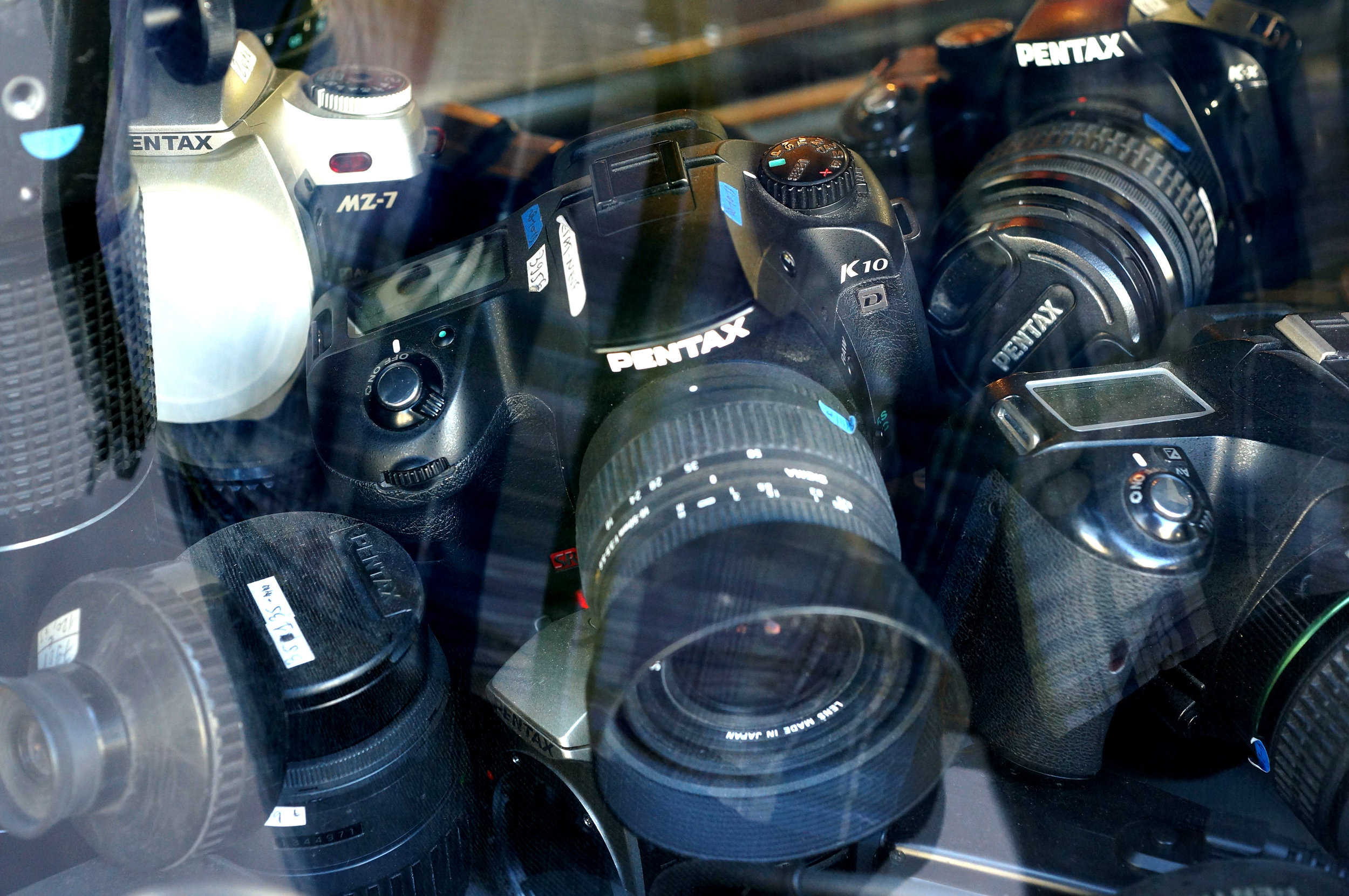Many of us, maybe most of us, are attached to things, care about things. We pick up our carry-ons when exiting burning airliners, which isn't really the same but makes a nice metaphor. The folly of materialism has been well explored and you should probably spend some quality time considering it. But for now, let's consider cameras.
I've owned some half-dozen digital cameras since the new millennium dawned. Each one (except the first, which fell into my lap like a careless match flicked into a barrel of oily rags) was hotly anticipated, greeted with great excitement. Each was fawned over, imbued with an importance that felt durable, fundamental to its qualities. And despite that, each was eventually set aside (save the last) in favor of something "better" for what I imagined my photographic project to be. Anyone with a digital camera history can guess at what got me excited: the ability to work with a paucity of light, to focus faster and more accurately, to record more detail. It all sounds kind of silly now, but that's not the point.
This progression, from torrid passion to dismissal in favor of the new thing, is something that I suspect is hardwired into our primate selves. Consumer capitalism has made a fine art of exploiting it, fanning the flames of desire for the next shiny thing with surgical precision, to layer cliches.
One of its favorite techniques is something I’ve seen referred to as the "demotion effect," though I googled this and couldn’t figure out if the term is in wide use. Regardless of terminology, you’ve almost certainly experienced it. You get a new thing, and you're happy. It’s the best thing! All the reviews say so! Then they make a new new thing that's nominally better, and your now-old thing, which hasn't changed since yesterday, suddenly seems less capable. You were happy with it before, but now you're not. And we all want to be happy. The solution is obvious. The very temporary solution.
It's easy to imagine how much "better" your photographs would be with a "better" camera. The bitter but also beautiful truth is that the only substantive upgrade is "no camera" to "camera." (Be sure to picture my air quotes as you read.)
The crazy thing is that, as with a lot of these primate deep-brain twitches, knowing the trick doesn't automatically immunize you to the effect. You would have to go through a process of introspection and careful evaluation to defuse the marketers' hold on you, and who the hell has time for that? I propose an easier way. This only works for cameras, but cameras are the only thing that really matters.
The solution is this: fall in love with the last of the line. Embrace extinction. I'm talking about film cameras. They stopped making new ones* (except for toy cameras and sculptures) a long time ago. All the good ones, the very best ones, are already here, and have been for decades. You can cut the line and start with the end. Take your love, open the back of your camera, and load it in there. Then do it again and again, because love is inexhaustible, and film will almost certainly outlive you despite the dire prognostications of a few pessimistic prognosticators.
With your love safely banked, you're free to see your digital camera for what it is: a very capable and useful tool that you will one day probably need to replace. "They" can keep rolling out shiny new things, and you can smile indulgently as folks froth at the mouth about a quarter-stop of additional dynamic range on sensors that can already record fireworks and fireflies in the same shot at billboard resolutions, because you never know when you'll want to make a billboard. Good for them, you can think, as you load a fresh roll of slide film.
To recap: digital cameras are just tools. Embrace extinction.
Your digital camera will probably die before you, but then you can get another one without the emotional whiplash of love or broken dreams being invloved, much as you'd get a new hammer if yours snapped and sent the steel head whanging just past your eye. That the new camera will be "better" in some benchmarkable ways will be a nice bonus (and don't cheap out on a hammer again, you bonehead -- you only get two eyes, no replacing those). But that betterness (the camera's) won’t lead you to delude yourself that owning the new thing will open transformative avenues of expression and/or revolutionize the practice of your photography, because you’ve put your delusions, along with your love (and is there really a difference?) into your film camera. In fact, by the time whatever digital camera you have now shuffles off, your phone will probably be fine taking up the slack. Or you’ll be wearing a digital camera all the time anyway.
Good film cameras, of course, never die: they merely pause their function to request service. The vessel for your love will live on and if the order of things is preserved will make its final exit when you're not around to suffer it, which is also what children are for, so don't forget to make time for those. And be sure to tell them that the camera gear you're hoarding in the closet might be worth something when you're gone, if only to a few foolish souls soldiering along right behind you.
*Yes, someone still makes new ones, but they're just new old ones, not new new ones.


